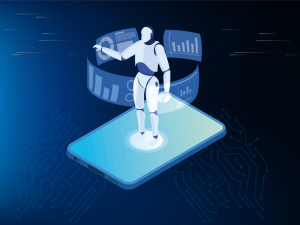Remember when being a “cloud architect” sounded like something out of a sci-fi novel? Fast forward to 2025, and the tech world is evolving faster than ever—bringing with it entirely new job titles that didn’t even exist a few years ago. Driven by AI, automation, green tech, and smart infrastructure, these emerging roles are shaping what it means to work in IT.
But what does this mean for learners and job seekers? Is your current career path future-ready? Or are there exciting new options that you haven’t even considered yet?
Let’s break down five fast-growing tech roles that didn’t exist five years ago—and how you can gear up to land one.
1. Prompt Engineer
What they do:
Prompt engineers design and refine the inputs that guide AI models like ChatGPT and image generators like Midjourney. These aren’t your average IT roles—prompt engineers are part creative, part technical, and entirely new.
Why it’s growing:
As AI models get more complex, knowing how to communicate with them clearly becomes a skill in itself. Companies need people who can coax the best results out of AI tools.
How to get started:
- Learn about generative AI platforms (ChatGPT, DALL·E, Claude).
- Take short courses in prompt design and prompt testing.
- Develop a portfolio of prompt use cases.
Bonus Tip:
If you’re already good at writing or critical thinking, you’re halfway there.
2. AI Ethics Analyst
What they do:
These professionals help companies build and deploy AI responsibly. They assess bias, data privacy risks, and compliance with AI regulations.
Why it’s growing:
As AI becomes mainstream, the risks of misuse, bias, and ethical violations are front and centre. Companies don’t just need AI—they need ethical AI.
How to get started:
- Explore ethics courses on AI and machine learning.
- Learn data governance frameworks (GDPR, ISO standards).
- Consider certifications in Responsible AI or AI policy.
Human Insight:
This is a great role for people who care about fairness, transparency, and tech’s impact on society.
3. Smart City Architect
What they do:
Design the digital infrastructure behind smart cities—think traffic systems, energy grids, and environmental sensors.
Why it’s growing:
Urban areas are embracing tech to reduce congestion, cut emissions, and improve quality of life. This takes a whole new type of systems designer.
How to get started:
- Learn about IoT (Internet of Things) and embedded systems.
- Build skills in cloud architecture, automation, and data visualisation.
- Understand how cities use data for planning and efficiency.
Real-World Angle:
This is where civil engineering meets data science—with a huge dose of purpose.
4. Green Cloud Engineer
What they do:
Build cloud infrastructure that’s energy-efficient and environmentally sustainable. Their goal? Lower digital carbon footprints.
Why it’s growing:
Data centres consume huge amounts of power. With pressure to hit climate goals, companies need cloud experts who can optimise for sustainability.
How to get started:
- Get certified in AWS, Azure, or Google Cloud.
- Learn how to measure and reduce cloud energy usage.
- Add a sustainability certificate like LEED Green Associate.
Personal Fit:
If you’re passionate about the planet and tech, this one’s a win-win.
5. AI Ops Specialist
What they do:
AI Ops (Artificial Intelligence for IT Operations) uses machine learning to monitor, manage, and troubleshoot systems. These specialists design tools that predict outages before they happen.
Why it’s growing:
IT teams are overwhelmed with alerts and logs. AI Ops makes sense of it all, automating tasks and spotting risks in real-time.
How to get started:
- Learn DevOps fundamentals.
- Study machine learning basics and automation tools.
- Look into AI Ops platforms like Moogsoft or Splunk.
Bottom Line:
DevOps meets data science—automating the most complex IT environments.
What This Means for You
If you’re in tech—or trying to break into it—the world of job titles is shifting fast. The good news? Most of these emerging roles are accessible with upskilling, not necessarily a new degree. Bootcamps, microcredentials, and targeted certifications can help you move faster than a traditional academic route.
At Ascend Education, we believe the best careers start with curiosity, not just credentials. Our platform is built to help you discover emerging trends, explore hands-on learning paths, and stay ahead of the curve.
So, whether you’re a high school graduate, career switcher, or lifelong learner, the next big role in tech might be one the world hasn’t even fully defined yet. And you could be one of the first to fill it.





